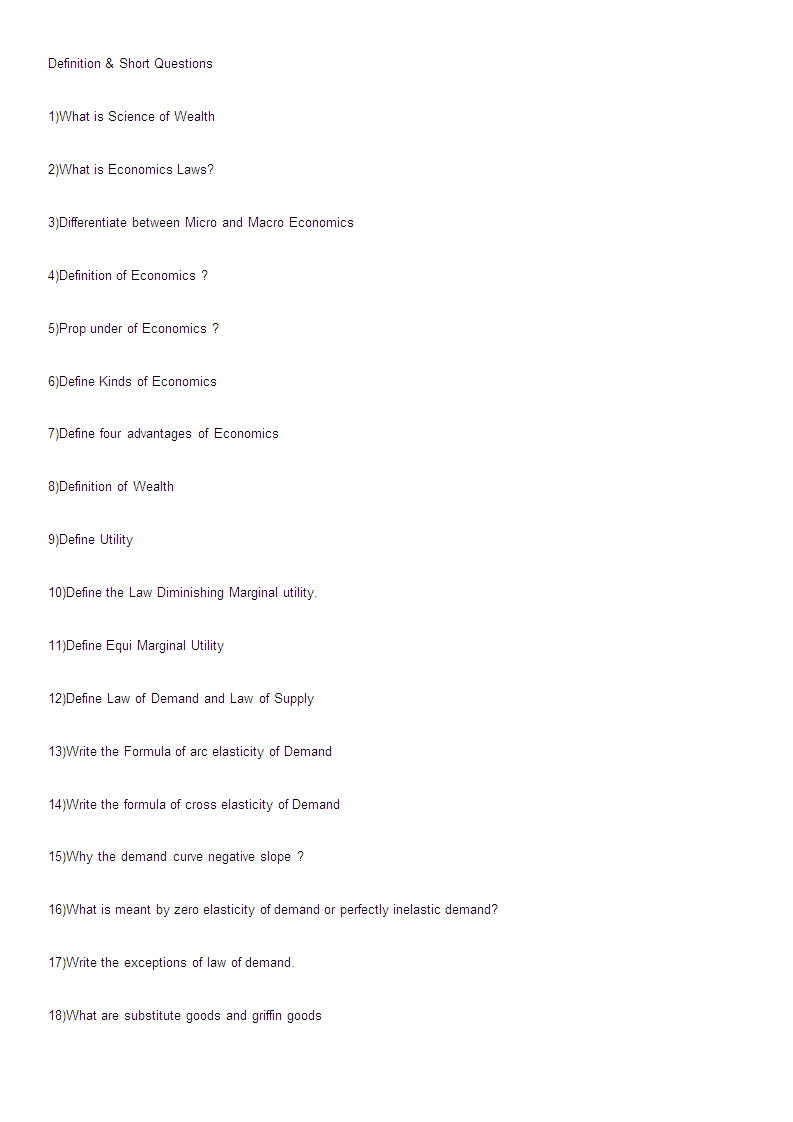-
Gallery of Images:

-
Ricardos book, On the Principles of Political Economy and Taxation, was first published in 1817 (London: John Murray, AlbemarleStreet), with second and third editions in quick succession. We present Ricardos final revision, the third edition, published in 1821, here. The three different editions encompassed several substantive changes in the development of Ricardos ideas. Principles of Economics with John Taylor This course is designed as an introduction to the study of economics. Participants will be exposed to the economic way of thinking and learn about the functioning of a modern market economy. Stepbystep solutions to all your Economics homework questions Slader ECNG 2301 Course Syllabus 3 Each student will have the opportunity to earn 3 of extra credit, which can be used to supplement their total possible score. Welcome to ECON101: Principles of Microeconomics! Below you will read pertinent information on this course, its resources, and its requirements. Course Designer: Professor Tony Pizur Dr. Bob McKizzie Principles of Economics. In the beginning, there was Menger. It was this book that reformulated and really rescued economic science. Investigations into the Method of the Social Sciences. Here is the book that gave the Austrian School its name. Economics ( k n m k s, i Alfred Marshall provides a still widely cited definition in his textbook Principles of Economics (1890) that extends analysis beyond wealth and from the societal to the microeconomic level: Economics is a study of man in the ordinary business of life. It enquires how he gets his income and how he. Download free the book Principles of Economics by G. Economics 212 Principles of Macroeconomics Study Guide David L. Kelly Department of Economics University of Miami Box Coral Gables, FL dkelly@miami. edu Save To Worklist Subject Code ECON (Economics) For course prerequisites purposes. ECON 101 is equivalent to ECON 310 or HXEC 111; ECON 102 is equivalent to ECON 311 or HXEC 112. Econ 101: Principles of Microeconomics Ch. 1: First Principles Fall 2010 Herriges (ISU) Chapter 1: First Principles Fall 2010 1 19. Outline 1 Principles that Underlie Individual Choice 2 Principles that Underlie Interactions of Individual Choices 3 Principles That Underlie EconomyWide Interactions 14. 01 Principles of Microeconomics is an introductory undergraduate course that teaches the fundamentals of microeconomics. This course introduces microeconomic concepts and analysis, supply and demand analysis, theories of the firm and individual behavior, competition and monopoly, and welfare economics. Students will also be introduced to the use of microeconomic applications to. Learn principles of economics with free interactive flashcards. Choose from 500 different sets of principles of economics flashcards on Quizlet. The CLEP Principles of Microeconomics exam covers material that is usually taught in a onesemester undergraduate course in introductory microeconomics. McEachern, ECON for Macroeconomics and ECON for Microeconomics (SouthWestern) Salvatore, Schaum's Outline of. Quizlet Study Set for Taylor Principles of Econ 4e Quizlet is an easytouse online learning tool built from all the key terms from the textbook. Students can turbo charge their studying via digital flashcards and other types of study apps, including tests and games. The most widelyused text in economics classrooms worldwide, this book covers only the most important principles to avoid overwhelming students with excessive detail. Extensive updates feature relevant, meaningful examples. Principles of Economics covers the scope and sequence for a twosemester principles of economics course. The text also includes many current examples, including; discussions on the great recession, the controversy among economists over the Affordable Care Act (Obamacare), the recent government shutdown, and the appointment of the United States. discuss the application of economic concepts and principles by comparison with their corresponding interpretations in the course; 5. use graphs to demonstrate the economic principles discussed in the Gregory Mankiw in his Principles of Economics outlines Ten Principles of Economics that we will replicate here, they are: People face tradeoffs The cost of something is what you give up to get it This course provides an introduction to a broad range of economic concepts, theories and analytical techniques. It considers both microeconomics the analysis of choices made by individual decisionmaking units (households and firms) and macroeconomics the analysis of the economy as a whole. Principles of EconomicsWhat Is Economics. The latest reviewed version was checked on 8 November 2017. There is 1 pending change awaiting review. Jump to navigation Jump to search. Economics is a social science that studies how people satisfy unlimited wants with scarce resources. University of Maryland University College offers a ECON course, Principles of Macroeconomics (ECON 201), toward online degrees and certificates. View Notes ECON 2105 Principles of Microeconomics syllabus online fall 2018 final. pdf from ACC 101 at Abraham Baldwin Agricultural College. Course Syllabus Fall 2018 ECON 2106 Principles of The purpose of this course is to provide you with a basic understanding of the principles of microeconomics. At its core, the study of economics deals with the choices and decisions that have to be made in order to manage scarce resources available to us. Principles of Macroeconomics with Connect Plus 5th edition, by Robert Frank and Ben Bernanke either the regular textbookconnect: ISBN. 7 economic principles study guide by 12russ includes 7 questions covering vocabulary, terms and more. Quizlet flashcards, activities and games help you improve your grades. Access our free college textbooks and lowcost learning materials. PRINCIPLES OF ECONOMICS continues to be the most popular and widely used text in the economics classroom. The fifth edition features a strong revision of content in all 36 chapters while maintaining the clear, accessible writing style and precise presentation that are the hallmarks of this highly respected author. Dozens of new applications emphasize the realworld relevance of economics for. Principles of Economics: Microeconomics By taking this free microeconomics course, youll be exposed to the economic way of thinking. Youll understand how to use economics in your life and, ultimately, see the world differently. Here is the best resource for homework help with ECON 2072: Principles of MacroEconomics at South University Campus Savannah Campus. Find ECON2072 study This course provides an introduction to current economic issues and to basic economic principles and methods. Economics is not primarily a set of answers, but rather a method of reasoning. By the end of the course, students are able to use the framework they have learned to form their own judgments. Microeconomics is all about how individual actors make decisions. Learn how supply and demand determine prices, how companies think about competition, and more! We hit the traditional topics from a collegelevel microeconomics course. ECON 200 (Principles of Economics I Macroeconomics) Knowledge of basic algebra; Ability to understand and use graphs and charts. The topics and issues discussed in microeconomics apply to all or most humans in the world. Principles of Economics: : Economics Books @ Amazon. Go class textbook text condition mankiw micro edition concepts school economic study macro examples chapter learn students econ college course microeconomics. There was a problem filtering reviews. Current Students; Study information; Search subjects; Subjects; Description. Students are introduced to economic analysis and its applications. Topics include: decision making, analysis of constraints, analysis of benefits and costs, maximisation, competitive pressures and market forces, and public policy. Mankiw, Brief Principles of Macroeconomics and Brief Principles of Microeconomics (SouthWestern) McConnell and Brue, Macroeconomics and Microeconomics (McGrawHill) McEachern, ECON for Macroeconomics and ECON for Microeconomics (SouthWestern) This course teaches the core principles of economics using a collection of experiments and workbooks. In the experiments, students become traders in a market and attempt to make profitable deals with one another. At the conclusion of the experiment, the data are used to form a customized, online. Economics is traditionally divided into two parts: microeconomics and macroeconomics. The main purpose of this course is to introduce you to the principles of macroeconomics. Macroeconomics is the study of how a country's economy works while trying to discern among good, better, and best choices for. Save To Worklist ECON 101 Principles of Microeconomics. Elements of theory and of Canadian policy and institutions concerning the economics of markets and market behaviour, prices and costs, exchange and trade, competition and monopoly, distribution of income. The purpose of this course is to provide you with a fundamental understanding of the principles of macroeconomics. Macroeconomists study how a countrys economy works and try to determine the best choices to improve the overall wellbeing of a nation. Econ Y is a platform applying academic principles in elaborate articles to current realworld topics concerning international politics, economics and finance. While sharing profound insights and discussing indepth, our readers are able to follow all topics through brief introductions on the relevant theory or linked supplemental articles. Mankiw's 10 principles of economics, translated for the uninitiated, by Yoram Bauman, . Presented at the AAAS humor session I. COURSE DESCRIPTION This course introduces the concepts, tools and methods of economics, including microeconomics, macroeconomics and international trade topics. Principles of Economics with John Taylor This course is designed as an eightweek introduction to the study of economics. Participants will be exposed to the economic way of thinking and learn about the functioning of a modern market economy. Download Free Lecture NotesPdf LinkXVIII Online Principles of Economics is a noncredit course and will not appear on a Johns Hopkins SAIS transcript. In place of a transcript, students will receive a letter of completion on Academic Affairs letterhead verifying their enrollment and final grade in the course. The Principles and Practice 1 of Economics Chapter Outline The Scope of Economics The First Principle of Economics: Optimization Three Principles of Economics The Third Principle of Economics: Empiricism Is Economics Good for You? 6 The Second Eco 200 Principles of Macroeconomics Course syllabus (in Adobe Acrobat format) Course description. Online lecture materials Chapter 1 Introduction: single document HTML format: Essential Principles of Economics: A Hypermedia Approach by Roger A. McCain (Drexel University) The central idea of economics is that people make choices with scarce resources, and they interact with other people when they make these choices. In Principles of Economics, you will be exposed to all of economics at a basic level. You will be introduced to microeconomics, learning how producers and consumers interact in markets, and learn about concepts important in economic decision making. Principles of Economics is a leading political economy or economics textbook of Alfred Marshall ( ), first published in 1890. It ran into many editions and was the standard text for generations of economics students..
-
Related Images:











